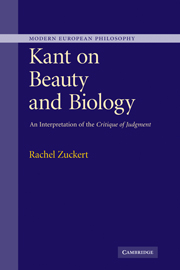Book contents
- Frontmatter
- Contents
- Acknowledgments
- Note on citations
- Introduction
- 1 The problem: The unity of the diverse
- 2 Reflective judgment and its principle: Preliminary remarks
- Part I Teleological judgment
- Part II Aesthetic judgment
- Introduction to Part II
- 5 Beautiful objects: Subjectively purposive form
- 6 Aesthetic pleasure: The feeling of subjective, projective temporality
- 7 The free harmony of the faculties: Purposiveness as the principle of aesthetic Beurteilung
- 8 The justification of aesthetic judgment: Purposiveness as the principle of reflective judging
- Conclusion
- Bibliography of works cited
- Index
8 - The justification of aesthetic judgment: Purposiveness as the principle of reflective judging
from Part II - Aesthetic judgment
Published online by Cambridge University Press: 22 September 2009
- Frontmatter
- Contents
- Acknowledgments
- Note on citations
- Introduction
- 1 The problem: The unity of the diverse
- 2 Reflective judgment and its principle: Preliminary remarks
- Part I Teleological judgment
- Part II Aesthetic judgment
- Introduction to Part II
- 5 Beautiful objects: Subjectively purposive form
- 6 Aesthetic pleasure: The feeling of subjective, projective temporality
- 7 The free harmony of the faculties: Purposiveness as the principle of aesthetic Beurteilung
- 8 The justification of aesthetic judgment: Purposiveness as the principle of reflective judging
- Conclusion
- Bibliography of works cited
- Index
Summary
We may now turn to Kant's central question in the CAJ: how to justify the claims to universal subjective validity in aesthetic judgments or how we may justifiably require all others to share our pleasure in representing an object. Despite the fact that such judgments do not make objective claims, Kant argues, they make justifiable claims on others because they are grounded in the subjective conditions for the possibility of experience. As suggested above, I shall reconstruct Kant's justificatory argument on the model (mutatis mutandis) of the CPR deduction of the categories (as it informs his treatment of judgments of experience, as we shall see): our claims in aesthetic judgments are justified because the principle of such judgments, purposiveness without a purpose, is an a priori principle that makes aesthetic experience possible – is, indeed, constitutive of such experience, of both the representation of objects as beautiful, and the feeling of aesthetic pleasure.
In this chapter, I shall, first, draw out the implication of the arguments to this effect in the preceding chapters, beginning by treating the relationship between Kant's account of aesthetic experience, particularly the activity of aesthetic Beurteilung, and the aesthetic judgment proper (Urteil) (8.1–2), before turning to the way in which the principle of purposiveness justifies aesthetic judgments. I shall argue that aesthetic judgments are justified because judging in accord with the principle of purposiveness is a condition not only for the possibility of aesthetic experience (8.4), but for the possibility of experience simpliciter (8.5f.).
- Type
- Chapter
- Information
- Kant on Beauty and BiologyAn Interpretation of the 'Critique of Judgment', pp. 321 - 367Publisher: Cambridge University PressPrint publication year: 2007



